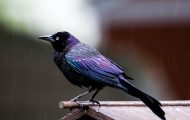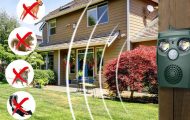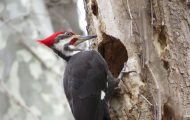Woodpeckers, as they are called, are designed to hammer their beaks on wood. They create holes on trees to drill for sap, eat insects inside, or store their collected food. However, this same habit will be problematic if the woodpeckers target the wooden parts of your property. This is why you should know how to keep woodpeckers away from the house before they can cause serious damages.
Why are woodpeckers hammering on my house?
Woodpeckers are nature’s wonders, having been blessed with strong beaks that can bore holes into wood. Unfortunately, this includes your house.
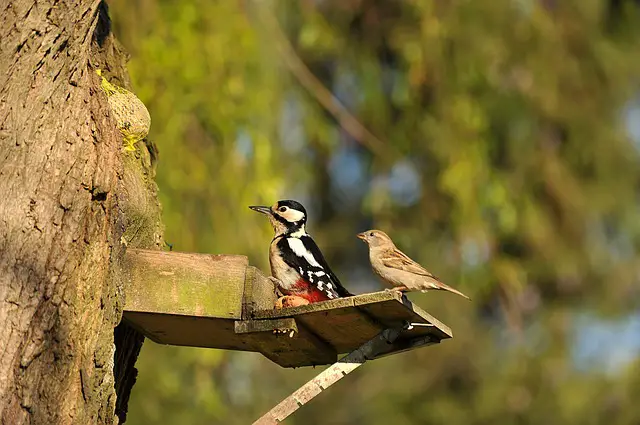
If you’re wondering why woodpeckers are targeting your home, the following might be the reasons why:
- They are nesting. Woodpeckers will look for a safe place to create a nest. This could be the wooden foundation of your porch or the beams on your unsealed attic. Take note that nesting holes of woodpeckers are larger and rounder than the typical holes they make on trees.
- They are declaring their territory. The pounding sound they make on wood is a declaration of their territory to other birds. Also, this means that the woodpecker is looking for a mate and not really boring a hole. Overall, this will stop after the mating season.
- They are storing food. Woodpeckers, especially Acorn Woodpeckers will drill holes on trees where they can store their acorns and other food. They will usually create small holes and stash one acorn each.
- They are feeding on insects. Woodpeckers also hammer on wood surfaces to look for insects they can eat. If this is the case, you should take the woodpeckers as a sign of an insect infestation in your home. Your house might be mired with termites and other wood-eating insects.
Whatever the cause of a woodpecker’s hammering on your house, you have to do something to scare the birds away. Their wood-pecking habits can cause serious damages to your home. If it goes on for months, large flocks of woodpeckers can compromise the structural integrity of your property.
How to keep woodpeckers away from house
1. Remove their food source
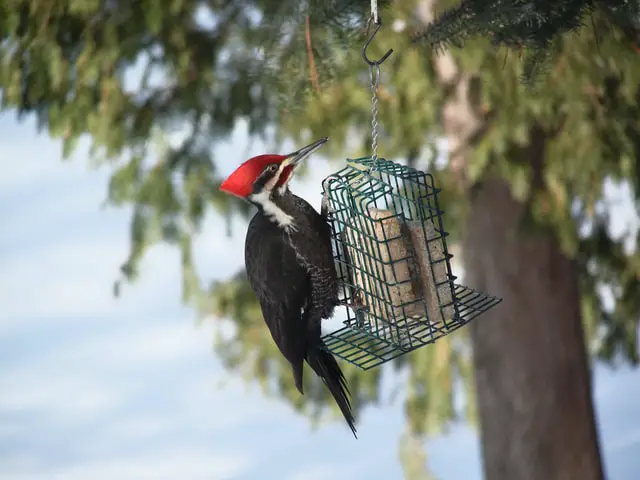
Woodpeckers visit your house frequently because it’s a steady source of food. This is why you should remove any food sources that they may be seeking, including a massive termite infestation. Even ants are appetizing for a hungry woodpecker.
You should also check bee and wasp hives in your house that might be attracting woodpeckers. It’s best to hire a professional bee removal company to handle the problem. Killing bees aren’t a good idea as they play an important role in pollination.
But in case you’re dealing with termites and planning to take matters to your own hands, you should be careful with the chemicals you’re going to use.
2. Lure them away
Another way to harmlessly drive woodpeckers away is to set up a lure. A suet feeder is an excellent solution here, so the birds won’t target your home for food. This will serve as a decoy feeder that will keep woodpeckers at a distance.
Suet feeders are a combination of insects, seeds, veggies, fruits and rendered animal fat. It’s best to put the suet inside a wire cage to prevent the bird’s body from directly touching it. While safe to eat, the fat on suet can make a woodpecker’s feathers sticky and therefore harder to fly. A good renewable option is the Kingsyard Recycled Plastic Suet Bird Feeder.
3. Start with visual scares
Aside from food-related solutions, woodpeckers are easy to scare with visual techniques. Fake owl statues are always handy in these situations as well as scare tapes and shiny items. Just make sure that the scare items are moving to keep it effective.
Woodpeckers find bright objects unappealing as they perceive it as blinding flashes of light. Many homeowners improvise with foil sheets, old CDs, small mirrors, and shiny iron sheets.
Aside from woodpeckers, visual scares are effective against other bird species.
4. Install netting protection
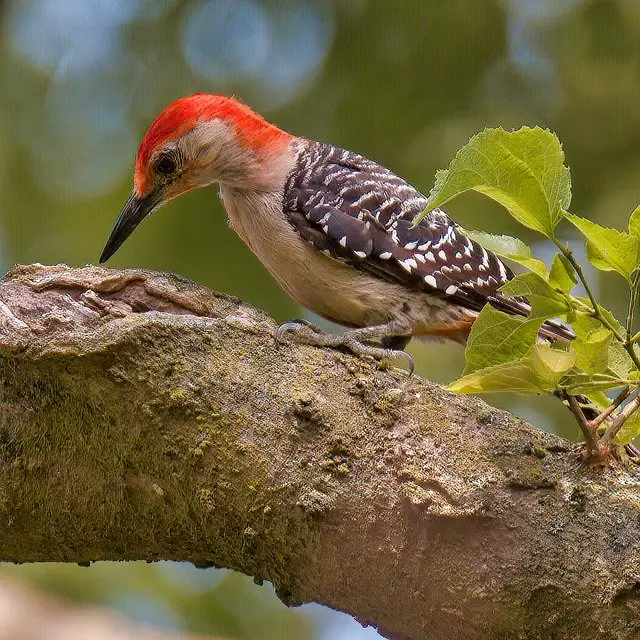
A net cover is a physical barrier that will block woodpeckers from getting into the wood surface. However, this takes more time and effort to install, but it’s very effective.
The rule of thumb for this method is to install the net at least three inches from the wood surface you want to cover. This way, the woodpecker’s beak won’t get into the wood.
Aside from that, the net material is soft and not a steady material for perching and pecking at the same time. Make sure that you use netting that are graded for construction and not those used for fishing and covering crops.
5. Wrap the wood with burlap
If the net material is an eyesore, you can wrap the affected wood with burlap instead. Basically, any industrial fabric will work here.
Burlap doesn’t allow woodpeckers to grip into the wood surface properly. And if they don’t have a strong grip, they can’t start pecking.
Just make sure that you use a thick kind of burlap in multiple layers. The good thing here is that burlap blends with natural wood colors.
6. Use a sound deterrent
Based on my experience, sound deterrents are also a good solution for woodpeckers. The sounds of hawks, coyotes, foxes, and bobcats can scare woodpeckers away. These animals are their direct predators.
You simply have to set up a speaker on the area of concern and play these sounds. It will yield better results when paired with visual scares and other methods listed here.
However, if you have a neighbor close to your property, you should explain what the noise is about. This may also give them an idea on how to repel birds that are pestering their properties.
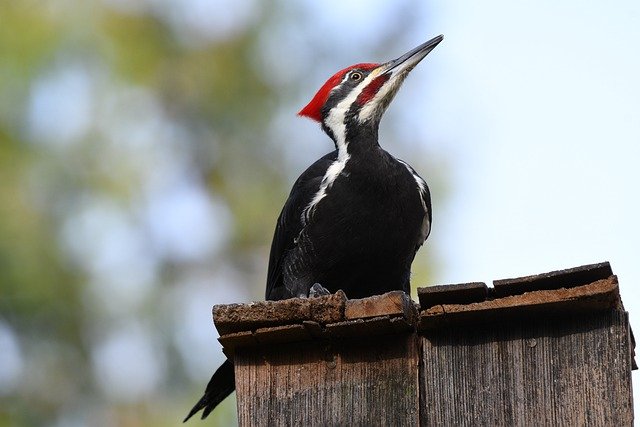
7. Be strategic with gardening
You should never plant fruit-bearing plants near wooden walls and posts. These fruits are attractive to woodpeckers and would bring them directly to where they can drill holes.
Still, it doesn’t mean you have to ditch your fruit patch. You just have to position it as far away as possible from any wooden structure.
Aside from that, woodpeckers are territorial and it’s not easy to convince them to change spots. So if you’re keen to have fruit-bearing bushes in your garden, you should plant it in the same spot away from your house.
You can also plant sap-filled trees or nut-bearing trees if you want to divert the woodpeckers into an alternative location.
8. Install roosting spikes
Roosting spikes are very effective in discouraging woodpeckers from perching and pecking on your house. You simply have to glue this on the affected areas and it will do its magic.
For example, if the woodpeckers keep hammering on your fence, you can install spikes along the surface. The spiky material will make it impossible for woodpeckers to have a durable grip.
Frequently Asked Questions
Q: What time of the day do woodpeckers peck?
A: Woodpeckers tend to peck more in the morning. They will drill and hammer at the first break of sunlight. As other birds chirp, woodpeckers peck on wood. This isn’t the most appealing way to wake up if the bird happens to be on your property.
Q: Can I shoot a woodpecker destroying my house?
A: All species of woodpeckers are protected under the Federal Migratory Bird Treaty Act. This means that you can’t intentionally kill them. Otherwise, you’ll be slapped with a hefty fine and a potential jail time. This is why you should only use humane and harmless methods to scare them away.
Q: Do woodpeckers wrap their tongues around their brains?
A: A fun fact about woodpeckers is that they do wrap their tongues around their brains. It’s because their beaks aren’t suitable for storing such long appendage. Also, by wrapping their tongues this way, their brains will be protected from the impact of their high-speed pecking.
Q: Why are woodpeckers destroying my house?
A: If woodpeckers are flocking your home, it might be a sign that there’s an insect infestation on your property. These birds feed on insects inside wood like termites, beetles, aphids, and caterpillars. So if you see a couple of woodpeckers knocking on your home’s wood, it’s best to schedule an inspection to be sure.
Q: Do woodpeckers ever get concussions?
A: While their pecking can reach a force that’s 1,000 times than gravity, woodpeckers don’t get concussions. Their heads are designed to endure such amounts of force. Also, they wrap their tongues around their brains to prevent any potential injury.
Q: Do woodpeckers peck at night?
A: Most woodpeckers will not peck at night since they are diurnal or daytime creatures. They have a sleep and wake cycle similar to humans, which follows the light pattern of their surroundings. But if your yard uses strong lights at night, a woodpecker or two may mistake it as daylight.
Final words
Woodpeckers can be destructive birds if you don’t control their population in your property. Knowing how to keep woodpeckers away from house is crucial to save yourself from the noise and property damage. Just remember to use humane ways as woodpeckers are protected under federal regulations. It’s illegal to kill them intentionally or trap them as pets.

